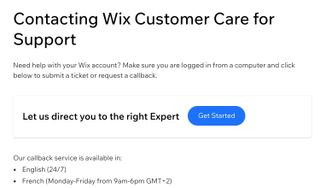WordPress vs Wix vs Squarespace
Our WordPress vs Wix vs Squarespace comparison evaluates all three website builders across a range of features

Using the best website builder for your business site can save you a huge amount of time and money. Website building platforms allow you to launch a professional website in hours and on a budget, where hiring a developer or web design agency might have previously cost thousands.
Many also include in-built hosting from the best web hosting services, as well as content management systems, which can make updating and populating your site with content as easy as sending an email. Here, we provide a direct comparison of WordPress vs Wix vs Squarespace, exploring their respective features, customer support, and pricing plans, to help you determine which is best for your website and business.
WordPress
WordPress: the top choice for blogging and beginners
WordPress.com is the best builder for blogging, offering a great selection of templates, a clear but simple interface, and a comprehensive range of tools. Its competitive paid plans provide added extras including enhanced support and access to a large template library.
Wix
Wix: the best all-round choice
Wix is one of the best website builders, as it offers a wide degree of flexibility, hundreds of templates, and a user-friendly drag-and-drop interface. Its range of pricing options are fair too, with the full website builder included with the free package, upgrades providing ad-free, feature-packed site editing, and a 14-day money-back guarantee.
Squarespace
Squarespace: leading on support and professional design
Squarespace’s professional templates and impressive native integrations build on powerful ecommerce integration. High-quality sites can be made without much experience, design flexibility matched by excellent and responsive support, and priced plans stacked with advanced features.
WordPress vs Wix vs Squarespace: What do they offer?
Before we dive in, it’s worth understanding the background of these platforms. WordPress is by far the most popular provider, and is estimated to power 42.1 percent of the world’s sites, or 708 million sites. It comes in two forms—WordPress.org and WordPress.com.
However, the “real” WordPress is WordPress.org, an open-source content management system that requires self-hosting via the best WordPress hosting platforms. When people talk about WordPress, they usually mean this, and it is what we’ll discuss. It has incredible customisability, although its user interface feels slightly dated.
Squarespace and Wix, on the other hand, are website builders, operating as a kind of one-stop shop for all your website creation needs. They include web hosting, a wide range of sleek and modern templates, drag-and-drop design creation tools, and maintenance of your site as standard. Therefore, they have a much shallower learning curve than WordPress.
Every time someone accesses your URL, they will be redirected to your site, the data for which is stored on your web host. Squarespace and Wix are hosted website builders, which means they handle the hosting in-house. WordPress is a self-hosted platform, however, so you’ll need to set up your own host.
Self-hosting is more complicated, but allows you greater control over your storage space, traffic capability, and pricing. Some of the best web hosting platforms also offer a bespoke WordPress linking service to make the process easier. We've gone into features in more detail below, specifically website building elements and ecommerce.
WordPress vs Wix vs Squarespace: Features

WordPress offers unlimited customisability when it comes to design, allowing you—or your hired freelancer or agency—to endlessly tinker with your site’s coding. Thousands of free and paid-for WordPress themes instantly allow you to change the styling and layout of your site without affecting its content.
When it comes to designing your site, WordPress allows you to add page builder plugins, such as WP Page Builder, Beaver Builder, or Divi. These often come with free templates and can allow you to construct pages with a drag-and-drop tool, making the design process more similar to what you might experience with Wix or Squarespace.
Squarespace doesn’t let you build a site from scratch in the same way as WordPress, but its templates are stunning and simple—ideal if your business has a visual product. Squarespace’s design tool can take some getting used to and tends to constrain you to your template’s parameters, but that’s not necessarily a bad thing if you don’t want to make major adjustments.
Wix is certainly the easiest platform for beginners to use, and offers more than 500 templates. Its drag-and-drop editor makes the design process incredibly intuitive. There are two forms of Wix to choose from: Wix ADI and Wix Editor. The former uses AI to generate a site for you, whilst the latter allows you to build a site manually.
Wix ADI is quick and easy to use, but uses predetermined content and sections. The editor, on the other hand, is more customisable, but makes it difficult to change your template after your site is set up.
WordPress was originally designed as a blogging site builder, and its content management system is second to none, allowing you to add video, images, and third-party apps with just a few clicks.
Squarespace’s content management system almost rivals WordPress. It includes categories (a way of organising your posts) and post scheduling, as well as a live preview of your site as you write. Wix, on the other hand, is more limited and doesn’t, for example, allow for custom layouts. But if you just need a simple blog with images, text, and video, it won’t let you down.
There have been some reports that Wix’s ecommerce functionality can impact on performance, but overall its offering is impressive, even including an all-in-one management tool to help you keep track of sales and shipping progress.
Squarespace also comes into its own in this area. Its ecommerce solution has all the features a professional store would need, including coupons, no transaction fees, and product image zooming.
WordPress doesn’t offer any kind of built-in ecommerce functionality, so you’ll need to import a plugin, the best of which is arguably WooCommerce. Totally free and easily scalable, it has a large community of developers to help get you set up and is owned by the same company as WordPress.
WordPress’s incredible array of functionality makes it the best platform in terms of features. Whilst it does have a steeper learning curve, the ability to make your site do almost anything is worth the time and effort.
WordPress vs Wix vs Squarespace: Support

Squarespace and Wix both offer customer support, as well as support forums, articles, and video tutorials. In fact, it’s pretty difficult to split them—whilst Squarespace offers 24/7 email support, Wix has phone lines where you can actually speak to someone, so it depends on your communication preference.
Both are undoubtedly better in this regard than WordPress, however. As it is open-source, WordPress is free to use, but offers no customer support. Your only option is to head to a public forum or go the DIY route with a YouTube tutorial. Plus, because your host is separate from the platform with WordPress, there’s always a risk of going round in circles when trying to find the source of a problem.
WordPress vs Wix vs Squarespace: Pricing and plans

WordPress is free, but almost always comes with unavoidable costs worth being aware of. First, you’ll need to find a web host. They massively vary in terms of price and add-ons, but a solid solution for a site with less than 10,000 users per month can be found for around £2.50 to £7.50 a month.
Plugins, which are additional bits of code to enhance your site—for example, to let you run ads—are usually free, but can cost £100 and can be charged as a one-off or recurrently. Whilst WordPress.com used to have a somewhat basic offering, it now has four tiers of business and ecommerce plans. Beware—on the free plan, your site will have “wordpress” in the URL, and adverts that you won’t earn anything from.
WordPress design templates vary in price from free to thousands of dollars, but we’d recommend a solution in the £15 to £35 range, where you’ll find lots of attractive options for a reasonable cost. Overall, then, you’re looking at around £150 to £200 for a respectable WordPress site over the course of the first twelve months.
Squarespace and Wix both have recurring payment plans which include a domain, hosting, and web design as standard, and offer various pricing structures depending on your needs. Sites on Wix’s Basic plan include ads, so this isn’t really a serious option for a business site.
Their first professional offering is the Unlimited package, for £11 a month, which offers 10GB storage and more than £75 worth of advertising vouchers as a sweetener. Squarespace’s Business plan chimes in at £21 a month, and has both unlimited bandwidth and storage and a free email address for the first year.
In both cases, you’ll pay around 20 percent less if you decide to pay annually rather than monthly. All included, Squarespace and Wix tally to around £175—over the course of the first year—for the kind of site a small- or medium-sized business will require.
WordPress vs Wix vs Squarespace: Verdict
Wix, Squarespace, and WordPress all allow you to make a professional website without breaking the bank. If you’re happy to spend a little more and invest some time into learning how to manage your site, then turn to WordPress, as its level of customisability is immense.
With a whole ecosystem of freelancers, agencies, and third-party content available to help, you’ll be able to build something that exactly suits your needs. However, if you want a professional-looking website made quickly, Wix and Squarespace are fantastic options.
In our view, Wix’s slightly more intuitive design process makes it marginally stronger for small and medium-sized enterprises than Squarespace—unless your business requires a particularly artistic design. That’s where Squarespace comes into its own, with templates that are, visually speaking, the best on the market.
Further reading on website builders
Make sure to read our interview with Wix's Head Product Manager Michal Bignitz, and check out our buying guides for the best small business website builders, the best ecommerce website builders, and the best free website builders.
Get the ITPro. daily newsletter
Receive our latest news, industry updates, featured resources and more. Sign up today to receive our FREE report on AI cyber crime & security - newly updated for 2024.
Toby is a freelance writer, editorial director and screenwriter who’s covered technology subjects across Tom’s Guide and IT Pro Portal. He’s also founding editor of satirical student magazine The Whip.





